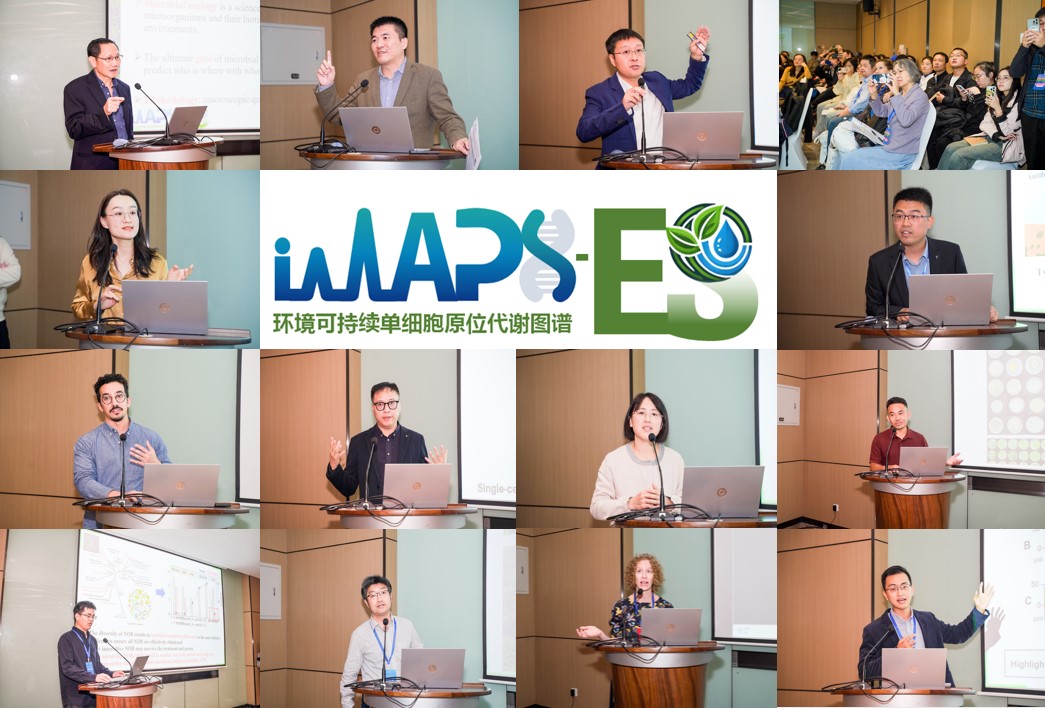Unveiling Life's "Dark Matter": Global Launch of iMAPS Drives Environmental Sustainability
October 27, 2024, the in-situ Metabolic Atlas Project @ Single-cell for Environmental Sustainability (iMAPS-ES) was launched during the 2024 Annual Academic Meeting of the Chinese Association of Microbial Ecology.
iMAPS-ES aims to revolutionize environmental sustainability through cutting-edge single-cell metabolic profiling and sorting instruments. Nearly 150 prominent researchers from global universities, research institutes, and industry convened in Qingdao to discuss the program's scientific mission, technological framework, and transformative potential in various fields of application.
The iMAPS-ES symposium featured presentations by experts, including Prof. ZHOU Jizhong from the University of Oklahoma, Prof. HUANG Wei E. from the University of Oxford, Prof. Rob Knight from the University of California, San Diego, Prof. TANG Hongzhi from Shanghai Jiao Tong University and over a dozen accomplished scholars. Each presented unique insights into the current challenges and opportunities in microbial ecology, highlighting how iMAPS-ES can drive essential discoveries for sustainable development.
Providing an industry perspective, Dr. TANG Ming, Chief Scientist at Procter & Gamble’s Global Fabric Care Academy, underscored the potential of iMAPS-ES to impact fabric, home, and personal care products by harnessing metabolic profiling to inspire innovations in product sustainability.
Prof. XU Jian from the Single-Cell Center at the Qingdao Institute for Bioenergy and Bioprocess Technology, Chinese Academy of Sciences, introduced the mission and framework of iMAPS-ES, highlighting the underlying instrument platforms such as high-throughput Raman-activated flow cytometers and the planned Microbiome Exploration Facility (MEx). These facilities enable rapid, in-depth metabolic profiling and sorting of live microbial cells within their native ecosystems.

Discussions centered on how iMAPS-ES can improve ecosystem health assessments and accelerate the identification of functional microbes for ecosystem remediation, with targeted applications in soil, water, forest, and grassland ecosystems.
Attendees were engaged in dynamic discussions on the scientific goals, industry demands, key technologies, platform development, applications, and collaboration models that form the foundation of iMAPS-ES. These exchanges focused on developing rapid ecosystem health assessment tools, identifying functional microorganisms, and designing effective bioremediation strategies for soil, water, forest, and grassland environments.
The iMAPS-ES is a specialized branch of the broader iMAPS (in-situ Metabolic Atlas Project @ Single-cell) initiative, which focuses on mapping metabolic functions of every individual microbial cells within their native ecosystems.
iMAPS seeks to address six critical questions in microbiome research—Who, What (in-situ metabolism), Why, Wealth (live microbes of target function), When, and Where—at single-cell precision and exhaustive depth. These insights will support innovations across environmental science, agriculture, health, and synthetic biology by enabling precise metabolic profiling and functional microorganism discovery.
Powered by innovative technology from the Qingdao Institute of Bioenergy and Bioprocess Technology, iMAPS international program will build a pioneering platform for single-cell, multi-omics profiling and live microbial resource discovery—enabling in situ metabolic function directed monitoring, screening, engineering, and synthesis of microbial ecosystems.
Beyond iMAPS-ES, researchers have collaborated with the National Pathogen Resource Center of Chinese Center for Disease Control and Prevention (NPRC, CDC) and the Institute of Agricultural Resources and Regional Planning, CAAS to launch other branches of the iMAPS initiative, including the Pathogen Ramanomics Engine Project (P.R.E.P.) and the Agricultural in-situ Metabolic Atlas Project @ Single-cell (Agri-MAPS).
Next, iMAPS will establish a national and global network of large-scale, high-throughput data production centers of MEx through collaborative efforts, so as to perform exhaustive “metabolic check-ups” and “in-situ metabolism directed single-cell cultivation” of microbiomes across entire ecosystems with single-cell precision. This unprecedented approach aims to propel Human and Earth Microbiome Projects (HMP / EMP) into an era of real-time metabolic monitoring and mining of in-situ functional microbes.
The iMAPS international program reflects four major directions in microbiome methodology: moving from genomics to metabolic phenomics, from population-level to single-cell precision, from traditional culture-based measurements to in-situ functional analysis, and from fragmentation between monitoring and mining to their integration. Additionally, the program is poised to advance China’s high-end life sciences instrumentation industry.